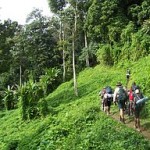In the last week, heavy rain caused rivers in Vermont to flood, and three cities needed to evacuate. A strong tornado leveled large swaths of Joplin, Missouri, killing 132 people. The Earth’s climate is changing and we’re all being impacted, including our places of work. So how do we respond?
For an answer, we look to Bangladesh, whose citizens are featured in the May 2011 issue of National Geographic as they continue to persevere in a drastically changing landscape.
Numbering 164 million, Bangladeshis inhabit a country roughly the size of Louisiana, where in the decades ahead rising sea levels are expected to displace several million coastal dwellers — just as Miami, New York and other coastal cities may experience. From the National Georgraphic piece:
The one commodity that Bangladesh has in profusion: human resilience. Before this century is over, the world, rather than pitying Bangladesh, may wind up learning from her example.
Concrete examples of Bangladeshis adapting to the shifting world include:
- Developing more salt-resistant strains of rice, and building dikes to keep low-lying farms from being flooded with seawater
- Building housing in sections that can be dismantled, moved and reassembled in a matter of a few hours
- Raising shrimps in ponds and growing vegetables on the embankments around them, because rivers are saltier than before, and water from the ground is too salty to grow rice.
If everybody emulates the resourcefulness demonstrated by Bangladeshis in these circumstances, we’ll likely weather the ravages of climate change less painfully.
What does it take to be more resourceful? We start with your willingness to reveal your whole self at work. Within you lies an ability to adapt to change, and thrive, yes? If we couple your resilience with your capacity to collaborate with coworkers, you will change your workplace — for the better.
And to understand the ultimate key to thriving through the world’s changing climate, consider this anecdote in the National Geographic article:
One day I was driving on one of the busiest streets in Dhaka–thousands of vehicles, all of them in a hurry–and I almost ran over a little boy, no more than five or six years old, who was fast asleep on the road divider in the middle of traffic. Cars were whizzing by, passing just inches from his head. But he was at peace, taking a nap in some of the craziest traffic in the world. That’s Bangladesh. We are used to precarious circumstances, and our expectations are very, very low. It’s why we can adapt to just about anything.
Perhaps lowering our expectations of what’s reasonably comfortable will help us manage the environmental crises ahead. Yet if we do expect these natural disasters to happen, we might summons our wherewithal to innovate now, in preparation of what’s to come.
Have you demonstrated resilience at work? In what circumstances?
Image of Bharidara area of Dhaka via



